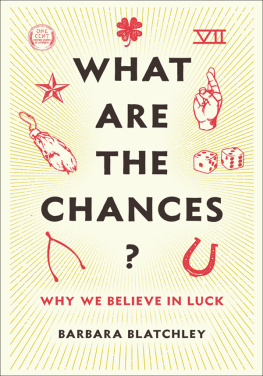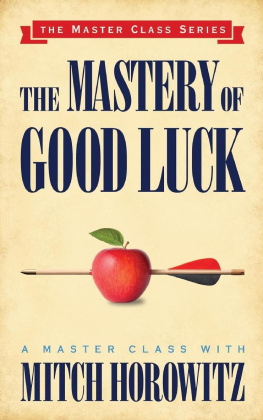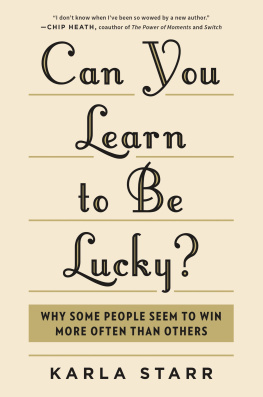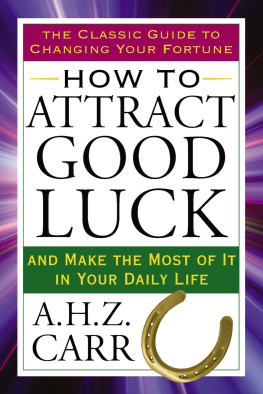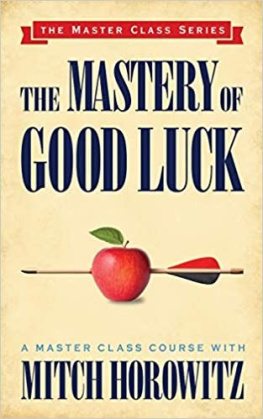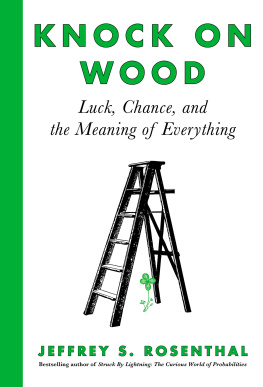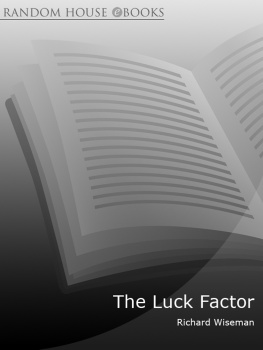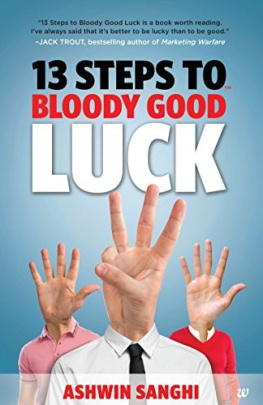Table of Contents
WHAT ARE THE CHANCES?
WHAT ARE
THE CHANCES?
WHY WE BELIEVE IN LUCK
BARBARA BLATCHLEY
Columbia University Press New York
Columbia University Press
Publishers Since 1893
New YorkChichester, West Sussex
cup.columbia.edu
Copyright 2021 Barbara Blatchley
All rights reserved
EISBN 978-0-231-55275-2
Library of Congress Cataloging-in-Publication Data
Names: Blatchley, Barbara, author.
Title: What are the chances? : why we believe in luck /
Barbara Blatchley.
Description: New York : Columbia University Press, 2021. |
Includes bibliographical references and index.
Identifiers: LCCN 2020050526 (print) | LCCN 2020050527 (ebook)
| ISBN 9780231198684 (hardback) | ISBN 9780231552752 (ebook)
Subjects: LCSH: Serendipity. | ChancePsychological aspects.
Classification: LCC BF637.S8 B53 2021 (print) | LCC BF637.S8
(ebook) | DDC 158.1dc23
LC record available at https://lccn.loc.gov/2020050526
LC ebook record available at https://lccn.loc.gov/2020050527
A Columbia University Press E-book.
CUP would be pleased to hear about your reading experience with this e-book at .
Cover design and illustration: Alex Camlin
This is for Christopher
CONTENTS
Luck is not chance
Its Toil
Fortunes expensive smile
Is earned
The Father of the Mine
Is that old-fashioned Coin
We spurned
EMILY DICKINSON, POEM #1350
LUCK AND THE HIGH SEAS
This book is about luck. We all know what luck means for us personally, but, as they say, one persons ceiling is another persons floorit might just depend on your perspective. Whats lucky for you can be completely different for the person standing next to you. So lets start with a question: What exactly is luck? Is it plain old hard work, as Emily Dickinson suggests, or is it random chance reaching out to smack you in the face or lift you into a new tax bracket? Can something be both good and bad luck at the same time? Perhaps a story will illuminate the answer. Lets take a look at what happened to Sarah Kessans and Emily Kohl.
In 2005 these two young women entered the Woodvale Events Transatlantic Rowing Race, billed as the toughest rowing race in the world. The competition involves rowing a boat across the Atlantic Ocean. Sarah Kessans very graciously agreed to let me interview her about her adventures at sea. My first question to her was, What possessed you to consider rowing a tiny, twenty-four-foot boat across the enormous Atlantic? Her reply was straightforward.
I fell completely in love with the sport of rowing from my first strokes on the Wabash River during my freshman year at Purdue. As I was returning from a trip to London, I stopped in a bookshop on Oxford Street to find something to read on the flight home. I picked up Debra Veals Rowing It Alone and nearly had it read by the time I touched down in Chicago. I was hooked. Ocean rowing was everything I loved about rowing, plus an absolutely incredible adventure and fortunately there was someone as crazy as I was [her racing partner, Emily Kohl] on the Purdue rowing team!
The race begins in the Canary Islands off the coast of Africa and ends in Antigua, almost three thousand miles with a whole lot of nothing but wide and empty water in between. Sarah and Emily were hoping to break the womens world record for rowing a double across a major portion of the Atlantic Ocean. A double is a small but very specialized rowboat. Theres a tiny, one-person-at-a-time cabin at the stern of the boat and an even smaller storage locker at the bow, two rowing positions, and not much else. The boat is so small that rowers have to trade off lying down in the cabin; one person rows while the other sleeps, or tries to, in the narrow, cramped quarters.
Sarah and Emily named their twenty-four-foot-long six-foot-wide vessel American Fire and trained like mad throughout the spring and summer of 2005 in preparation for the race. Both had been members of the Purdue University rowing team, so they had lots of experience with distance rowing. The Purdue University Boilermakers make their home in West Lafayette, Indiana, about sixty miles northwest of Indianapolis. The campus is surrounded by waving seas of corn and soybeans, but there is not much in the way of open ocean of any description.
Both young women knew that ocean training was essential, so in the summer of 2005, Emily and Sarah moved themselves and their boat to Florida to train on the Intracoastal Waterway. They rowed back and forth between Fort Lauderdale and Miami, building their stamina for the fifty- to sixty-mile days of rowing they wanted to log during the race itself.
The race began with what could be interpreted as a bad omena sign that bad luck and difficult circumstances were on the way. The race was scheduled to begin November 27, 2005, taking advantage of what usually is the end of hurricane season in the Atlantic. Unfortunately, the 2005 season was the most active in recorded history, cataloging so many storms (including the infamous hurricane Katrina that devastated the Gulf Coast) that forecasters used up all the names on the official list and had to use Greek letter names for the last six storms of the season.
The racers finally left tiny La Gomera in the Canary Islands on November 30 and quickly encountered unusually strong winds, very high seas, and extremely difficult rowing conditions. Hurricane Epsilon, a strange, late-in-the-season storm was churning the seas and began to move eastward December 1, 2005.being blown backward in the strong winds. When able to move westward again, the rowers passed through the southern edge of Tropical Storm Zeta and into even more difficult conditions.
After a month and a half of nonstop daily rowing and battling the seas, on January 15 conditions became so bad that the crew of American Fire was forced once again to set their sea anchor and wait. Part of the steering mechanism on their boat had snapped, and they needed calmer water in which to work to reattach it. The horrendous weather drove both Sarah and Emily into the cabin, and the small space quickly grew stifling. They turned on the ventilation system, confident that the design of the vents would keep water from the large waves crashing over the boat outside the cabin.
At about 2:30 P.M., Sarah says they had radioed the Aurora, the closer of the two support vessels for the racersa mere three hundred miles ahead of American Fire (the other support vessel, the Sula, was six hundred miles behind them). In a brief conversation, they advised the crew of the bad weather and their forced stop. At that time, the Aurora had their hands full rescuing another boat that had capsized earlier in the day. Around 4:30 P.M., Emily had the radio in her hand to call Aurora again when the worst possible thing that could happen, happeneda large rogue wave slammed into the port side of the boat (thats the left side for all us landlubbers), rolling the boat completely over. Water was now rushing into the cabin through the still-open vents.
They were in big trouble now. Water was filling the boat, they were unable to stop it, and the boat was upside down in the middle of the Atlantic Ocean, in the middle of the winter, in horrid weather. Sarah reached the hatch just in time to see that the wave had snapped the lines holding their life raft. She watched the life raft disappear between the waves, and along with it went their survival gear. Both women struggled to get clear of the waterlogged debris and wreckage that made movement inside the cabin almost impossible.

